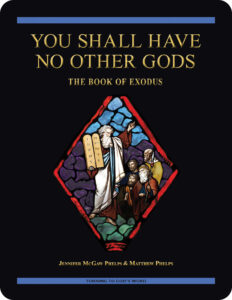 You Shall Have No Other Gods:
You Shall Have No Other Gods:
The Book of Exodus
Lesson 14 Manna from Heaven & Water from the Rock
the book of Exodus 16:1—17:16
Revised Standard Version Catholic Edition (RSVCE)*
New American Bible Revised Edition (NABRE)*
Catechism of the Catholic Church
Rosarium Virginis Mariae (Rosary of the Virgin Mary)
ex libris (in our library)
glossary for the book of Exodus
cross references in the book of Exodus
next lesson: Moses Receives Wise Counsel
This material coordinates with Lesson 14 on pages 68–73 in the study book You Shall Have No Other Gods: The Book of Exodus.
And God spoke all these words, saying, ‘I am the LORD your God, who brought you out of the land of Egypt, out of the house of bondage. You shall have no other gods before me. You shall not make for yourself a graven image, or any likeness of anything that is in heaven above, or that is in the earth beneath, or that is in the water under the earth; you shall not bow down to them or serve them; for I the LORD your God am a jealous God, visiting the iniquity of the fathers upon the children to the third and the fourth generation of those who hate me, but showing mercy to thousands of those who love me and keep my commandments.”—the book of Exodus 20:1–6
welcome to our in-depth study of the book of Exodus
We invite interested groups and individuals to check out the sample first lesson from this 28- lesson Turning to
lesson Turning to  God’s Word Catholic Bible study. These online study pages link to our free lesson video overviews, as well as to a glossary and cross references in the biblical text. Other study aids include maps, additional commentary, and prayers based on the primary Scripture in each lesson. You Shall Have No Other Gods: The Book of Exodus has been granted an imprimatur and can be purchased from our website shop. If you have a Bible-study question or comment, click on one of the “ask us your question” or “what do you think” buttons on any online study page.
God’s Word Catholic Bible study. These online study pages link to our free lesson video overviews, as well as to a glossary and cross references in the biblical text. Other study aids include maps, additional commentary, and prayers based on the primary Scripture in each lesson. You Shall Have No Other Gods: The Book of Exodus has been granted an imprimatur and can be purchased from our website shop. If you have a Bible-study question or comment, click on one of the “ask us your question” or “what do you think” buttons on any online study page.
open with prayer
It’s always wise to begin any Bible study with prayer, whether reading the Scriptures alone or meeting with others in a discussion group. You can pray using your own words or use one of the opening prayers on our website. We especially like the following:
Lord Jesus, you promised to send your Holy Spirit to teach us all things.
As we read and study your word today,
allow it to touch our hearts and change our lives. Amen.
let’s review—the book of Exodus 15:1–27
Lesson 13 Song of Moses & Song of Miriam contains what may be the most well-known song in the Old Testament. In the Song of Moses, the people celebrate the LORD’s saving action of leading them through the Red Sea and destroying their enemies, the Egyptians. The refrain—“Sing to the LORD, for he has triumphed gloriously; the horse and his rider he has thrown into the sea”—is repeated as the Song of Miriam. In typical human fashion, it doesn’t take the Israelites long to begin finding fault with their situation, and the fifteenth chapter in the book of Exodus ends with the people murmuring against Moses at Marah because there’s no drinkable water. The LORD instructs Moses to throw a tree into the bitter water, which then becomes sweet. The book of Exodus describes this incident as a test of the people by God, who’s described as the people’s healer. From Marah the descendants of Jacob journey to Elim, an area with 12 springs and a vast number of palm trees, where they camp by the water.
the Israelites are on the move
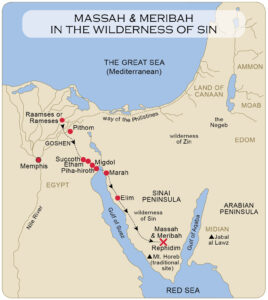 The beginning of the sixteenth chapter in the book of Exodus describes the Israelites setting out from Elim, where they’ve been encamped at an oasis area. The LORD leads them south into the wilderness of Sin, and from there they travel on further south to Rephidim, where once again the people begin murmuring against Moses because there’s no decent drinking water available. Moses in turn complains about the people to the LORD, who instructs him to strike a rock at Mount Horeb with his rod. When Moses does so, enough water comes out of the rock to satisfy the people. Moses then calls the location Massah and Meribah because the Israelites tested the LORD there. Click on the map (right) to enlarge it. The original map is on page 71 in You Shall Have No Other Gods: The Book of Exodus.
The beginning of the sixteenth chapter in the book of Exodus describes the Israelites setting out from Elim, where they’ve been encamped at an oasis area. The LORD leads them south into the wilderness of Sin, and from there they travel on further south to Rephidim, where once again the people begin murmuring against Moses because there’s no decent drinking water available. Moses in turn complains about the people to the LORD, who instructs him to strike a rock at Mount Horeb with his rod. When Moses does so, enough water comes out of the rock to satisfy the people. Moses then calls the location Massah and Meribah because the Israelites tested the LORD there. Click on the map (right) to enlarge it. The original map is on page 71 in You Shall Have No Other Gods: The Book of Exodus.
 the murmuring continues (01:09:10)
the murmuring continues (01:09:10)
When the Israelites murmur at Marah, God seems to understand that they’re  uncertain about their new situation. They’ve just been uprooted from their homes in Egypt. Turning to God’s Word author Matthew Phelps explains that it’s not surprising these descendants of Jacob experience anxiety about their situation in the wilderness—especially concerning where they’re going to find such basics as food and drink. The book of Exodus, however, has recorded that after the people leave Elim, they’re given plenty of evidence that God intends to take care of their needs. In the book of Exodus 16:4, God
uncertain about their new situation. They’ve just been uprooted from their homes in Egypt. Turning to God’s Word author Matthew Phelps explains that it’s not surprising these descendants of Jacob experience anxiety about their situation in the wilderness—especially concerning where they’re going to find such basics as food and drink. The book of Exodus, however, has recorded that after the people leave Elim, they’re given plenty of evidence that God intends to take care of their needs. In the book of Exodus 16:4, God  provides manna, which is described as a test in the RSV2CE; the earlier RSVCE translation uses older phrasing and the passage describes the manna God sends as a “proof” of the people instead of as a “test.” In both cases, the LORD’s purpose is to establish whether the Israelites are learning any faith. Sadly, they aren’t.
provides manna, which is described as a test in the RSV2CE; the earlier RSVCE translation uses older phrasing and the passage describes the manna God sends as a “proof” of the people instead of as a “test.” In both cases, the LORD’s purpose is to establish whether the Israelites are learning any faith. Sadly, they aren’t.
The Scripture ranges for the videos that accompany this Catholic Bible study from Turning to God’s Word match the Scripture ranges for the sets of questions in You Shall Have No Other Gods: The Book of Exodus. You can follow along as Turning to God’s Word author Matthew Phelps discusses Lesson 14, “Manna from Heaven & Water from the Rock,” on pages 68–73 in the study book.
test—you could look it up in our archives
 In the Revised Standard Version Second Catholic Edition (RSV2CE) and the New American Bible Revised Edition (NABRE) the book of Exodus 16:4 (NABRE) is translated as the LORD telling Moses that he plans to test whether the Israelites intend to follow God’s laws. (The older Revised Standard Version Catholic Edition [RSVCE] translates that same verse slightly differently, substituting “prove” for “test.”) Many people have difficulty with either version. To learn more about the meaning of the word “test” in Scripture, read Lost in Translation, an online column in which Turning to God’s Word author Matthew Phelps helps readers connect with ideas expressed in the original languages of the Scriptures. New Lost in Translation entries are posted on Mondays, and past entries are archived on our website. Contact us if you’d like to receive Lost in Translation by email every week.
In the Revised Standard Version Second Catholic Edition (RSV2CE) and the New American Bible Revised Edition (NABRE) the book of Exodus 16:4 (NABRE) is translated as the LORD telling Moses that he plans to test whether the Israelites intend to follow God’s laws. (The older Revised Standard Version Catholic Edition [RSVCE] translates that same verse slightly differently, substituting “prove” for “test.”) Many people have difficulty with either version. To learn more about the meaning of the word “test” in Scripture, read Lost in Translation, an online column in which Turning to God’s Word author Matthew Phelps helps readers connect with ideas expressed in the original languages of the Scriptures. New Lost in Translation entries are posted on Mondays, and past entries are archived on our website. Contact us if you’d like to receive Lost in Translation by email every week.
the importance of the seventh day
In the book of Exodus 16:22–30, the LORD issues instructions through Moses about how much manna the Israelites are to gather in preparation for the sabbath. At this time, observing the seventh day (the sabbath) as a day of rest continues to be the most important religious ordinance for these people. It’s at this time way more important than sacrifices or the law. The sabbath is the key and foundational observation upon which everything else can be built. In the book of Genesis 2:1–3, the first book of the Old Testament, the LORD established the sabbath (and the first sabbath that was from the beginning). God is teaching and reinforcing this first because without it, none of the other laws matter. That’s  obviously still the case. You can learn more about Creation and the first sabbath in Lesson 1 And God Said, Let There Be Light in the Turning to God’s Word Catholic Bible study In the Beginning: The Book of Genesis.
obviously still the case. You can learn more about Creation and the first sabbath in Lesson 1 And God Said, Let There Be Light in the Turning to God’s Word Catholic Bible study In the Beginning: The Book of Genesis.
pray with the Psalms—what’s the deal with Meribah & Massah?
Psalm 95 notes the difficulty that Moses and the LORD experience when the people complain about not having fresh water. This occurs near a large rock at Mount Horeb,  which after the LORD’s intervention, is renamed Meribah and Massah by Moses. Psalm 95:7–9 refers to this event as a test put to God by the Israelites. In the sixteenth chapter of the book of Exodus, the same event is described as God testing the people’s willing to trust (or proving their faith—the RSVCE and RSV2CE translations differ slightly). The RSVCE translation of the book of Exodus 16:4 is: “Then the LORD said to Moses, ‘Behold, I will rain bread from heaven for you; and the people shall go out and gather a day’s portion every day, that I may prove them, whether they will walk in my law or not.” The RSV2CE translation is reprinted with this lesson in You Shall Have No Other Gods: The Book of Exodus. Prayed
which after the LORD’s intervention, is renamed Meribah and Massah by Moses. Psalm 95:7–9 refers to this event as a test put to God by the Israelites. In the sixteenth chapter of the book of Exodus, the same event is described as God testing the people’s willing to trust (or proving their faith—the RSVCE and RSV2CE translations differ slightly). The RSVCE translation of the book of Exodus 16:4 is: “Then the LORD said to Moses, ‘Behold, I will rain bread from heaven for you; and the people shall go out and gather a day’s portion every day, that I may prove them, whether they will walk in my law or not.” The RSV2CE translation is reprinted with this lesson in You Shall Have No Other Gods: The Book of Exodus. Prayed  every Sunday at Vigils (Weeks I and II), Psalm 95 will be included as part of Lesson 1 He Who Sits in the Heavens Laughs and Lesson 15 Let Us Ring Out Our Joy to the LORD, both in the Turning to God’s Word Catholic Bible study Sing a New Psalm: Communicating with God Through the Prayers of the Church—Volume II: Vigils, Day Prayer & Compline, scheduled for release in late summer of 2024.
every Sunday at Vigils (Weeks I and II), Psalm 95 will be included as part of Lesson 1 He Who Sits in the Heavens Laughs and Lesson 15 Let Us Ring Out Our Joy to the LORD, both in the Turning to God’s Word Catholic Bible study Sing a New Psalm: Communicating with God Through the Prayers of the Church—Volume II: Vigils, Day Prayer & Compline, scheduled for release in late summer of 2024.
so what’s the deal with the Amalekites?
The following information is from the online glossary for this study. The seventeenth  chapter in the book of Exodus identifies Amalek as the first of the enemies encountered by the Israelites after escaping from slavery in Egypt. Using Moses in a dramatic fashion, the LORD allows the Israelites to triumph in battle with the Amalekites. Descendants of Jacob’s brother Esau, the Amalekites are related to the Edomites but distinct from them. Amalek can refer to Esau’s grandson or to all of his descendants. The name Amalek means “a people who take away all.”
chapter in the book of Exodus identifies Amalek as the first of the enemies encountered by the Israelites after escaping from slavery in Egypt. Using Moses in a dramatic fashion, the LORD allows the Israelites to triumph in battle with the Amalekites. Descendants of Jacob’s brother Esau, the Amalekites are related to the Edomites but distinct from them. Amalek can refer to Esau’s grandson or to all of his descendants. The name Amalek means “a people who take away all.”
more about the relationship between Israel & Edom
The longstanding family feud between descendants of these twin sons of Isaac is nothing new. The  short and little-read Old Testament Book of Obadiah is focused almost entirely on the Edomites as an enemy of the Israelites. The Turning to God’s Word Catholic Bible study Thus Says the LORD: God Speaks Through His Servants the Prophets—Volume II: Restoration & Redemption provides an in-depth look at the Book of Obadiah. Feel free to check out the online material, including a video, for Lesson 6 Obadiah’s Oracles Against Edom in Thus Says the LORD: God Speaks Through His Servants the Prophets—Volume II: Restoration & Redemption.
short and little-read Old Testament Book of Obadiah is focused almost entirely on the Edomites as an enemy of the Israelites. The Turning to God’s Word Catholic Bible study Thus Says the LORD: God Speaks Through His Servants the Prophets—Volume II: Restoration & Redemption provides an in-depth look at the Book of Obadiah. Feel free to check out the online material, including a video, for Lesson 6 Obadiah’s Oracles Against Edom in Thus Says the LORD: God Speaks Through His Servants the Prophets—Volume II: Restoration & Redemption.
what Matthew says—Moses can teach us about prayer
In the book of Exodus 17:8–13, Moses’ prayer proves successful against the attack by the Amalekites.  The biblical text makes it clear that victory is ensured by Moses raising his hands, although Joshua is directly leading the battle. Turning to God’s Word author Matthew Phelps explains that both Moses and Joshua are types of Jesus Christ but in different ways—Joshua by name and Moses more by action. This passage also offers an important insight about prayer, intercessory or otherwise. Moses’ prayer needs to be complete and constant to deliver victory for the people. It’s not enough that he lights a candle and goes about his day. God responds to Moses’ prayer while Moses is praying and not when Moses gets tired and stops.
The biblical text makes it clear that victory is ensured by Moses raising his hands, although Joshua is directly leading the battle. Turning to God’s Word author Matthew Phelps explains that both Moses and Joshua are types of Jesus Christ but in different ways—Joshua by name and Moses more by action. This passage also offers an important insight about prayer, intercessory or otherwise. Moses’ prayer needs to be complete and constant to deliver victory for the people. It’s not enough that he lights a candle and goes about his day. God responds to Moses’ prayer while Moses is praying and not when Moses gets tired and stops.
oops—a correction in the study book
In the second paragraph of the commentary, “God Rains Down Bread from Heaven,” on page 72 in the study book, “consubstantiation” (a real word) will be replaced by “transubstantiation” (the right word). The offending sentence will be corrected in the next and subsequent printings to read:
Through the act referred to as transubstantiation, the bread and wine offered on the altar become the body and blood of Jesus.
t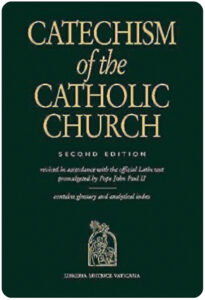 he best Catholic commentary about Scripture
he best Catholic commentary about Scripture
To find out more about how Church teaching is supported by Scripture passages in You Shall Have No Other Gods: The Book of Exodus, check out the Index of Citations in the Catechism of the Catholic Church. Links (Revised Standard Version Catholic Edition [RSVCE*]) to the primary Scripture passages in the lesson and relevant paragraphs in the Catechism are provided here. Not every passage in the biblical text for this Catholic study is referenced in a Catechism paragraph, however.
the book of Exodus 16:19—paragraph 2836
the book of Exodus 16:19–21—paragraph 2837
the book of Exodus 17:1–6—paragraph 694
the book of Exodus 17:2–7—paragraph 2119
the book of Exodus 17:8–13—paragraph 2577
ways our glossary might prove helpful
In addition to providing extra information about geographical locations, our glossary also points out  when a person or place is mentioned in the biblical text under more than one name or more than one spelling. If you can remember a name but aren’t sure in which lesson it shows up, you can find it in the glossary, which lists every proper noun that appears in the biblical text for every lesson in You Shall Have No Other Gods: The Book of Exodus.
when a person or place is mentioned in the biblical text under more than one name or more than one spelling. If you can remember a name but aren’t sure in which lesson it shows up, you can find it in the glossary, which lists every proper noun that appears in the biblical text for every lesson in You Shall Have No Other Gods: The Book of Exodus.
to learn more, read more Scripture
If you’re having difficulty with a particular passage of Scripture, it can be helpful to read the relevant  cross references—but looking these up can take time. To make that easier, we’ve compiled the cross references from the Revised Standard Version Second Catholic Edition (RSV2CE)—the translation that we reprint in our study books. That list can be found at the top of every online study page accompanying this study, and it includes links to each of the cross references in the primary biblical text for You Shall Have No Other Gods: The Book of Exodus.
cross references—but looking these up can take time. To make that easier, we’ve compiled the cross references from the Revised Standard Version Second Catholic Edition (RSV2CE)—the translation that we reprint in our study books. That list can be found at the top of every online study page accompanying this study, and it includes links to each of the cross references in the primary biblical text for You Shall Have No Other Gods: The Book of Exodus.
don’t forget about our indexes & extra online material

 If you’re trying to locate information about a specific Scripture passage, you can look it up in the index at the back of the study book or sample lesson. If you want to find a particular commentary, you can look up its title in the topics index. To learn more about another book of the Bible for which there’s a Turning to God’s Word study, visit the online study directories to read the commentaries and watch any accompanying videos. Finally, if you have a question or would like to make a comment about any of our studies, you can use one of the “ask us your question” or “what do you think” buttons to email our authors.
If you’re trying to locate information about a specific Scripture passage, you can look it up in the index at the back of the study book or sample lesson. If you want to find a particular commentary, you can look up its title in the topics index. To learn more about another book of the Bible for which there’s a Turning to God’s Word study, visit the online study directories to read the commentaries and watch any accompanying videos. Finally, if you have a question or would like to make a comment about any of our studies, you can use one of the “ask us your question” or “what do you think” buttons to email our authors.
ex libris—Church documents & books about religious topics
Link to magisterial documents referred to in our Bible studies at ex libris—magisterial documents.  This listing includes significant recent encyclicals as well as a number of historical Church documents. Recommended books related to Scripture study can be found at ex libris—main bookshelf.
This listing includes significant recent encyclicals as well as a number of historical Church documents. Recommended books related to Scripture study can be found at ex libris—main bookshelf.
wondering how to pronounce some of these words?
The following link is to a reading from the New International Version (NIV) Bible. To listen, open the link and click on the audio icon above the printed text. Although not taken from the translations used in our study materials, the NIV reading provides an audio guide to pronunciation of words in this lesson’s primary biblical text. A close online version of the translation of the Bible used in Catholic liturgy in the United States as well as an audio guide for daily Mass readings for the current month can be found on the website of the United States Conference of Catholic Bishops (USCCB).
the book of Exodus 16:1—17:16 (NIV)
 close with Bible-based prayer related to this lesson
close with Bible-based prayer related to this lesson
Many of our Catholic study groups like to conclude their discussions with a prayer based on the scriptural focus of their lesson, and some participants include Scripture-specific prayer in their individual study. If you’re uncomfortable composing your own Bible-based prayers, you can follow our four easy steps. If you prefer, you can use the following short prayer based on this lesson’s text from the book of Exodus.
O God, you always have the needs of your people in mind.
Help us not to complain or lose faith
as the Israelites did in the wilderness.
Enable us to trust that you’ll provide
what’s truly in our best interest.
We ask this in the name of Jesus Christ,
who accepted your will in all things. Amen.
Lesson 15 Moses Receives Wise Counsel, the book of Exodus 18:1–27
Lesson 13 Song of Moses & Song of Miriam, the book of Exodus 15:1–27
you also may like our study of Scripture & the Rosary (digital only)
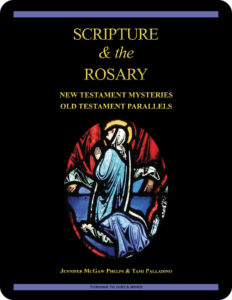 Scripture & the Rosary: New Testament Mysteries, Old Testament Parallels, a 26-lesson Catholic Bible study with an imprimatur, looks at the biblical foundations of the Rosary. The study includes lessons on Pope St. John Paul II’s Rosarium Virginis Mariae (Rosary of the Virgin Mary), the Apostles’ Creed, and the Luminous Mysteries as well as the original 15 Mysteries of the Rosary. Color photographs of stained glass windows depict key scenes in the lives of Jesus and Mary. Free digital lessons rotate throughout the year on our website.
Scripture & the Rosary: New Testament Mysteries, Old Testament Parallels, a 26-lesson Catholic Bible study with an imprimatur, looks at the biblical foundations of the Rosary. The study includes lessons on Pope St. John Paul II’s Rosarium Virginis Mariae (Rosary of the Virgin Mary), the Apostles’ Creed, and the Luminous Mysteries as well as the original 15 Mysteries of the Rosary. Color photographs of stained glass windows depict key scenes in the lives of Jesus and Mary. Free digital lessons rotate throughout the year on our website.
start a Turning to God’s Word Bible study
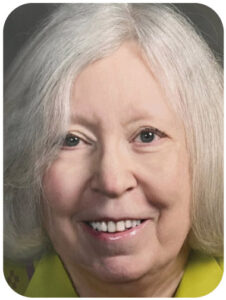 Thank you for your interest in You Shall Have No Other Gods: The Book of Exodus.
Thank you for your interest in You Shall Have No Other Gods: The Book of Exodus.  Information about beginning a Turning to God’s Word Bible study can be found at start a Bible study. Tami, Matthew, and I are available to answer your questions and to offer support. You may use this email to contact us directly if you’re interested in starting a Turning to God study or in having your study schedule listed with other TtGW study groups on our website. —Jennifer
Information about beginning a Turning to God’s Word Bible study can be found at start a Bible study. Tami, Matthew, and I are available to answer your questions and to offer support. You may use this email to contact us directly if you’re interested in starting a Turning to God study or in having your study schedule listed with other TtGW study groups on our website. —Jennifer
*There are seven deuterocanonical books in the Old Testament—the Books of Tobit, Judith, Wisdom, Sirach, Baruch, and First and Second Maccabees, as well as some passages in the Books of Esther and Daniel. Protestants usually refer to these works as “apocryphal,” a word that means “outside the (Protestant) canon” because they’re excluded from most Protestant Bibles. The word “deuterocanonical” means “second canon”; Catholics use that word to refer to any section of the Catholic Old Testament for which there are no extant, or existing, Hebrew manuscripts. All of the deuterocanonical books appear in the Septuagint, the earliest remaining versions of which date to the 1st century B.C. This Greek translation of the Old Testament was in common use by Jews at the time of Jesus—but the same books aren’t found in existing Hebrew manuscripts, which aren’t as old as the oldest version of the Septuagint. Learn more by reading How Do Catholic & Protestant Bibles Differ?
Turning to God’s Word printed Bible studies use the 2006 Revised Standard Version Second Catholic Edition (RSV2CE) translation for all Scripture references except those to the Psalms, which are taken from The Abbey Psalms and Canticles, prepared by the Benedictine monks of Conception Abbey and published in 2020 by the United States Conference of Catholic Bishops (USCCB). All Scripture links for the online study pages for You Shall Have No Other Gods: The Book of Exodus are to the 1966 Revised Standard Version Catholic Edition (RSVCE) translation. The New International Version (NIV) audio recordings follow the same chapter and verse numbering as the RSV Catholic translations, but the NIV translation doesn’t include the deuterocanonical books and passages.
The 1966 RSVCE uses archaic pronouns and verb forms such as “thee,” “thou,” “didst” in the Psalms and in direct quotations attributed to God. The 2006 RSV2CE replaces those with more accessible English. The few significant translation changes in the RSV2CE include rendering almah as “virgin” in the Book of Isaiah 7:14 and restoring the term “begotten” in the Gospel According to John 3:16.
Numbering varies for some passages in this Bible study. Turning to God’s Word studies (print and digital) follow the numbering in the Revised Standard Version Catholic translations (RSV2CE and RSVCE). Discrepancies in the New American Bible Revised Edition (NABRE) are noted in the Index of Scripture Citations in the study book and the online sample.
 You can learn more about the Psalms by viewing a sample lesson from the Turning to God’s Word Catholic Bible study Sing a New Psalm: Communicating with God Through the Prayers of the Church—Volume I: Lauds & Vespers. The second part of that study, Sing a New Psalm: Communicating with God Through the Prayers of the Church—Volume II: Vigils, Day Prayer & Compline, is scheduled for publication in 2025. Some verse numbers may vary in different translations of the Psalms.
You can learn more about the Psalms by viewing a sample lesson from the Turning to God’s Word Catholic Bible study Sing a New Psalm: Communicating with God Through the Prayers of the Church—Volume I: Lauds & Vespers. The second part of that study, Sing a New Psalm: Communicating with God Through the Prayers of the Church—Volume II: Vigils, Day Prayer & Compline, is scheduled for publication in 2025. Some verse numbers may vary in different translations of the Psalms.
